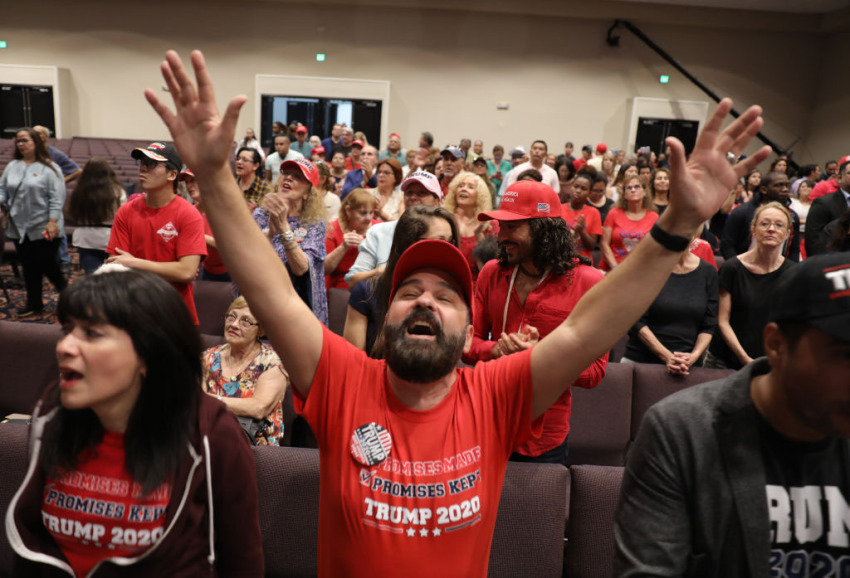Evangelicals view Supreme Court most favorably amid big term for religious freedom cases: poll

With the U.S. Supreme Court set to hear a handful of religious freedom-related cases in 2020, a new report from Pew Research suggests that Christians are more likely than religiously unaffiliated Americans to hold a positive view of the nation’s high court.
According to a Pew survey of over 1,500 adults in the United States conducted in July 2019, 62 percent of Americans say they have a “favorable” opinion of the Supreme Court while 31 percent said they hold an “unfavorable” view of the Supreme Court.
When broken down by religious affiliation, the survey shows that 69 percent of Christian respondents view the Supreme Court favorably compared to just 51 percent of religiously unaffiliated respondents.
Meanwhile, 41 percent of religiously unaffiliated respondents said they view the Supreme Court unfavorably and 24 percent of Christian respondents said the same.
But more than seven-in-10 (72 percent) of self-identified white evangelical Protestants and 72 percent white non-evangelical Protestants said they have “favorable” views of the Supreme Court. Seventy percent of Catholics said the same.
Only 20 percent of white evangelicals said they hold an unfavorable view of the Supreme Court while 23 percent of white non-evangelical Protestants said the same.
“With several religion-related Supreme Court cases in the news, we wanted to examine how attitudes about the court — and some of the issues it’s tackling this year — differ by religious identity and political affiliation,” Pew senior writer Dalia Fahmy wrote in the report.
The results come as today’s Supreme Court leans conservative thanks to the confirmation of two justices nominated by President Donald Trump during his three years in office: Brett Kavanaugh and Neil Gorsuch.
In 2020, the Supreme Court will hear cases related to social issues that many conservative Christians voters consider important, such as abortion and the intersection of religious freedom and LGBT rights.
On Wednesday, the Supreme Court heard oral arguments in a case involving a court-blocked Louisiana law that requires abortion doctors to have admitting privileges at nearby hospitals.
Since June Medical Services v. Russo is the first abortion-related case the Supreme Court will hear since the confirmations of Kavanaugh and Gorsuch, abortion rights proponents fear the potential for the court to deal significant blows to previous rulings that have codified abortion as a national right.
The court announced last month that it would weigh the legality of the city of Philadelphia’s move to expel a Catholic charity from its foster care program because the organization follows Catholic teachings and does not place children in the homes of same-sex couples.
Also, the Supreme Court will hear at least three cases this year that deal with whether a Title VII law banning discrimination based on sex also protects bans discrimination based on gender identity and sexual orientation.
The most prominent of the three cases is one involving a Christian-owned funeral homeowner who faced action from the Equal Employment Opportunity Commission after he fired a transgender employee who refused to wear clothing that corresponds with the employee’s birth sex.
In recent years, the Supreme Court has issued favorable rulings in prominent religious freedom-related cases. Those include the court’s ruling in 2018 in favor of a Christian baker punished for refusing to bake a custom cake for a same-sex wedding, and a 2017 ruling in favor of a church daycare barred by the state of Missouri from a secular funding program.
According to the new Pew report, Americans’ views on the Supreme Court “diverge along party lines.”
Three-quarters (75 percent) of Republican respondents or Republican-leaning Independents said they viewed the Supreme Court favorably with just 18 percent saying they hold an unfavorable view of the court.
By contrast, only 49 percent of Democrats or Democrat-leaning Independents said they hold a favorable view of the Supreme Court. Forty-four percent of Democrats or Democrat-leaning Independents said they hold an “unfavorable” view of the Supreme Court.
“Religiously unaffiliated adults — that is, who identify as atheist, agnostic or ‘nothing in particular’ — are largely Democratic, while white evangelical Protestants are solidly Republican and Republican-leaning,” Fahmy wrote in her analysis.
Part of the reason why President Donald Trump had such strong support among conservative white evangelicals in the 2016 presidential election was due to the promises he made to appoint originalist and conservative judges to the Supreme Court and federal courts.
While much has been made about the confirmations of Kavanaugh and Gorsuch, Trump has boasted about how 218 of his judicial nominees have been confirmed as federal court judges in the last three years.
Pew reports that Republicans and white evangelicals view the Supreme Court much more favorably than they did during the years of Democrat Barack Obama’s presidency.
In 2015, the same year the Supreme Court made same-sex marriage a national right and upheld a key element of Obamacare, only three-in-10 white evangelicals held favorable views of the Supreme Court.
But in 2019, Pew’s research shows that white evangelicals (61 percent) were the group most likely to say that they favor overturning Roe v. Wade, the Supreme Court’s landmark 1973 decision making abortion a national right.
By comparison, just 26 percent of white non-evangelical Protestants and 28 percent of Catholics agreed. But 89 percent of religiously unaffiliated respondents and 87 percent of Democrat and Democrat-leaning Independents said they oppose overturning Roe.
Follow Samuel Smith on Twitter: @IamSamSmith
or Facebook: SamuelSmithCP



























